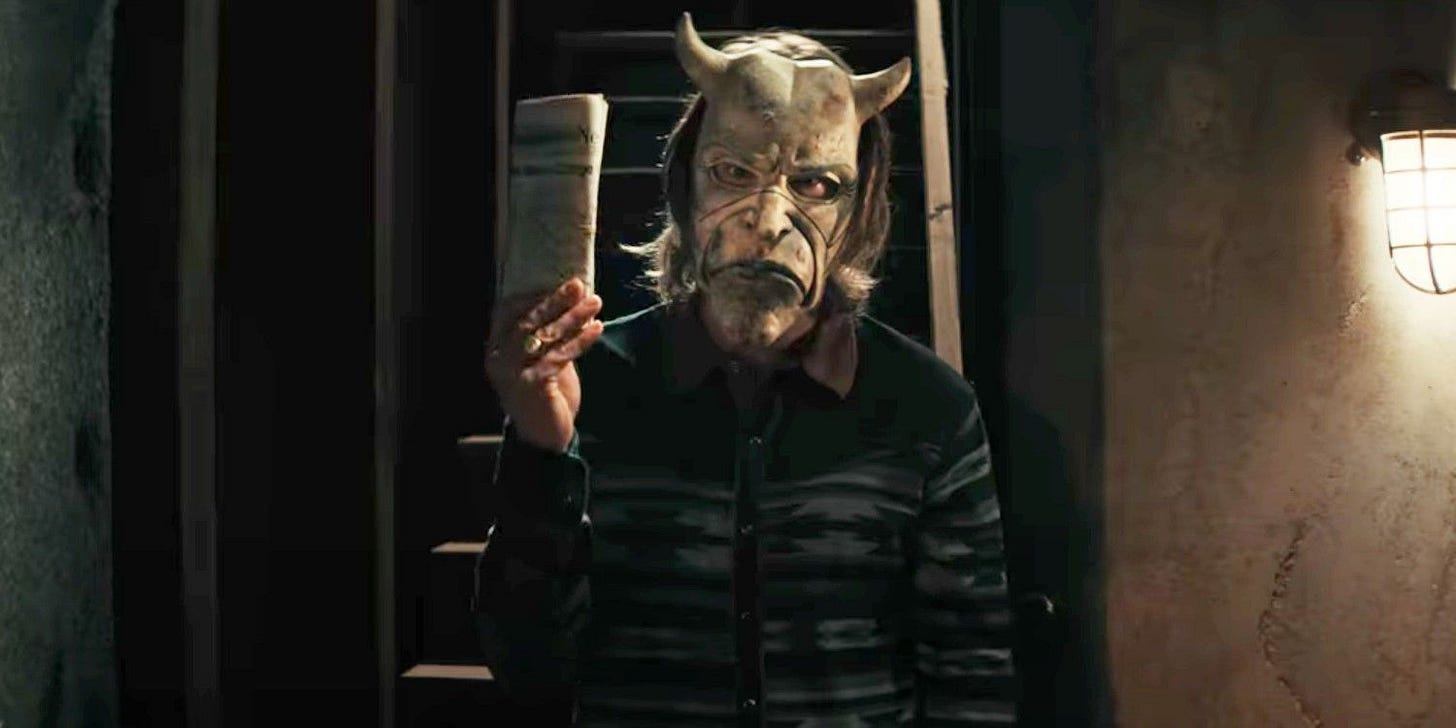The Black Phone
An utterly terrifying and sharp horror/thriller that puts us in the shoes of a child serial killer's latest would-be victim.
“Tell me your name.”
“What do you care?”
“…I usually don’t.”
I’ll admit I grade horror films on a pretty harsh scale.
I grew up with grisly movies and am unashamed of having an appetite for gore, moments of sudden terror and gallows humor. But because I’m such a fan of the genre, it also means my scare threshold is higher than most. It’s rare that a modern horror film leaves me genuinely rattled.
“The Black Phone” certainly does that. It’s an utterly scarifying flick, but also a very smart one with some really authentic performances, both by veteran actor Ethan Hawke and a pair of child actors.
It’s directed by Scott Derrickson, who made a name for himself with a string of scary movies (“The Exorcism of Emily Rose,” “Sinister”) and then was handed the keys to the “Doctor Strange” franchise. He reportedly passed on a chance to direct the sequel to make this movie, which has had its release delayed several times by COVID.
That’s a pretty gutsy move to pass on a surefire MCU project. I’m sure Derrickson’s agent had a thing or two to say. But he’s made a top-drawer horror that will surely linger for a long time.
Based on a story by Joe Hill, the script is by Derrickson and Robert Cargill. It relies on some familiar tropes of the horror genre, but also turns some on their head or approaches the story from angles we don’t expect.
The first act builds up the tension as a string of kids have gone missing in Denver circa 1978. The picture really nails the look-and-feel of that time, from the snug T-shirts to the cheap polyester baseball caps, floppy longer hairstyles and egregious car designs.
Mason Thames plays Finney, a smart, introverted kid of about 13. Like most other students at his school, he’s heard stories about “The Grabber” responsible for disappearing children — all boys, between about 12 and 15. He’s not really concerned because it’s usually somebody from the other side of town.
Things become real when Bruce Yamada (Tristan Pravong), an ace baseball player he ran into at a game, becomes the latest to disappear. Then tragedy strikes close to home when Robin Arriano (Miguel Cazarez Mora), the toughest boy in school and occasional protector of Finney, goes missing.
Finney’s slightly younger sister, Gwen (Madeleine McGraw), who’s even smarter and much sassier than he, has dreams about a mysterious van filled with black balloons associated with the (presumed) killer, which draws the attention of the detectives on the case. Jeremy Davies plays their dad, an abusive alcoholic still mourning the death of their mother, which is alluded to be a suicide resulting from mental illness. She was also “touched” by dark dreams that came true, and he insists — violently, if needs be — that Gwen ignore their siren call.
Hawke doesn’t even turn up until around the 30-minute mark, snatching up Finney and depositing him in a cold, stone basement where he will spend the rest of the movie. Other than a bed and toilet, the only notable feature is the titular phone, the old rotary style bolted to the wall with the receiver in a cradle.
We only see Hawke’s entire face for a few fleeting moments. Most of the time he wears an odd, grayish demonic mask split horizontally below the nose. Occasionally he turns up with just the top or bottom half — I don’t know which is more unnerving — speaking to Finney in a teasing, sing-song voice. He alternates between threats to kill him painfully and promising to free him if Finney is a good boy.
But if he’s naughty…
Without ever overtly stating it, it’s clear that the Grabber is a demented sort who sexually abuses and then kills his victims. Finney is aware of this, adding to his terror, but he bravely tries not to show his fear. He works on various possibilities for escape. Meanwhile, the story cuts back-and-forth to Gwen and the detectives for the crime procedural portion.
(I deem it inevitable that the film will spark outrage from LGBTQ Twitter about having a villain who’s attracted to same-sex children. As if the Grabber would be more or less evil if he favored girl victims. I give this stuff about as much credence as I do the idiot “groomer” claptrap. Reminder: Twitter is not real life.)
Help arrives from the most unexpected source: the phone. Despite being disconnected — the Grabber eerily mentions it hasn’t worked “since I was a boy” — it begins ringing and Finney hears strange voices talking to him. Are they figments of his imagination? Part of the Grabber’s psychological torture M.O.?
I’ll say no more.
Thames and McGraw are standouts in their roles, and paired with Hawke’s icy, giggly killer makes for quite the unusual character triangle. Cutting away from and back to Finney’s standoff with the Grabber only enhances the tension, as we have time to reflect on the stakes while Gwen is doing her psychic Nancy Drew thing.
I didn’t go into “The Black Phone” expecting much. So many lauded horror movies of the last few years have left me cold. This is scary as scary gets.






Looks like a winner!!!!!